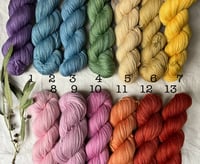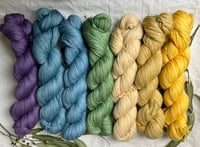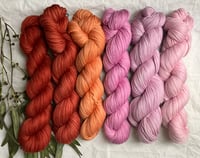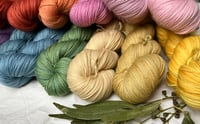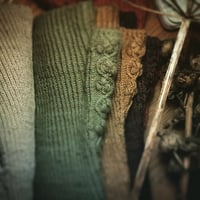MERINO
Superwash, extra fine, Australian merino hand dyed with flowers, plants and some insects. Each color is unique, often unrepeatable,.
Non melesed sheep.( The Responsible Wool Standard (RWS) defines mulesing as any traditional or non- traditional method of removing the skin around the breech and tail of the lambs.)
Very soft, warm and light yarn, with nice stitch definition.
Demanding very gentle care
Sock weight, or 4ply small skein with 100 grams and 400 meters.
Gauge - 34,5 sts X 54 rows (rounds) = 10 cm X 10 cm with 2,25 mm needles
1 - purple - logwood
2, 3 - blue - indigo (almost same, but I preferred to put them separately)
4 - green - indigo and weld
5 - beige - alder
6 - mustard - indigo, onion and ginestra (with some green speckles, only few)
7 - bright yellow - ginestra and weld
8 - pink - cochineal
9 - sweet violet - logwood
10 - darker pink - cochineal
11 - orange - madder
12, 13 - red - madder (nearly same, but slightly different)
Care of natural dyed textiles
Naturally dyed textiles are unique products and, like any fine textile, should receive hand washing or gentle machine washing in cool water, follow by line drying.
Careful cleaning will make a textile (and dyed) last longer. Some dyes are specially sensitive to changes in pH. Mordant and some dyes are sensitive to some dry-cleaning fluids or to the use of strong alkaline soaps. Only a mild, neutral detergent should be used for washing natural dyed textiles. (J. Boutrup, C. Ellis: The art and science of natural dyes)
Hand wash only with minimum agitation.
